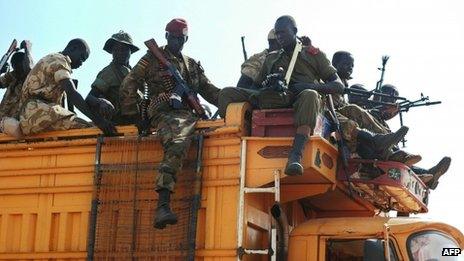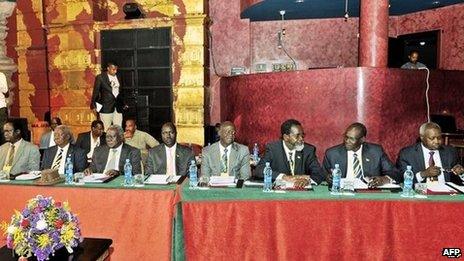Is the US powerless in South Sudan?
- Published
- comments
Rev Thon Moses Chol says violence in his home country is "heartbreaking"
In a church in Alexandra, Virginia, just across the river from Washington DC, the congregation sing a solemn, gentle hymn in Dinka, one of the languages of South Sudan.
There are more upbeat songs too, but this is a fairly reflective gathering. At the front of many minds is the violence that is ripping through their homeland, the world's youngest state.
The Reverend Thon Moses Chol, external offers a prayer, acknowledging the hurt, the heartbreak and the victims, as well as the yearning for an end to this latest bout of killing.
South Sudan entered 2014 in chaos - the government blaming a coup, the rebels claiming an ethnic massacre was underway.
The only thing that everyone can agree on is that there is a massive humanitarian crisis.
'Find a voice'
Rev Chol arrived in this country with nothing but a plastic bag, a refugee from the civil war that raged for half a century.
Now he is proud to call himself an American. Proud too that US Presidents Clinton, Bush and Obama helped South Sudan separate and forge a new nation out of the brutalities of a bitter civil war.
"The history of America, they stand with those who are weak and those who need to find a voice," he says.
"And I kind of felt many of us were in that search, the need to find a voice and freedom, and I think they were there for us to secure that freedom."
Now the US seems more like worried well wishers.
While many in the region and the wider world fret about American disengagement, the US is not disengaged from this crisis. Over the holiday period and ever since, the White House has held crisis meeting after crisis meeting.
It is little wonder - so many in this administration have invested so much in this new country.
When South Sudan became independent President Obama said: "Today is a reminder that after the darkness of war, the light of a new dawn is possible."
His secretary of state, John Kerry, attended South Sudan's referendum as a US senator. Susan Rice, now his national security advisor, constantly pushed for the creation of the state.
Back to war?
Now the president's special assistant, Gayle Smith, is taking the lead in the crisis meetings.
When I meet her at the White House she doesn't look exhausted but jokes that she and her staff have barely seen their beds since the conflict began. She too is another Africa expert with decades of involvement in Sudan.

Government soldiers on their way out of Juba, South Sudan's capital
She rejects suggestions they're not doing enough: "We're working on multiple fronts 24/7."
"This is going to be an enormous political challenge to get parties that, very quickly took a political dispute to the battlefield, to bring it back to the peace table.
"They've got them there, they are pushing them towards the issues and the negotiators aren't giving up. They can't resolve this on the battlefield. If they do that it takes South Sudan back to war and it risks ethnic conflict."
John Temin of the US Institute for Peace says this crisis is getting more attention than others might because of the history of Sudan.
"In many ways the US has an added responsibility here and an added ownership of what is happening in this new country because the US is so closely connected with its creation.
"It is more moral than geopolitical," Mr Temin says. "The fact that so much diplomatic capital has been invested in South Sudan as well as real money, does it give it some significant importance around Washington."
Ignoring the US
He has no doubt the US government has been heavily engaged in trying to solve the crisis. Whether it makes much difference is another question.
"I think the US policy makers are struggling to figure out which levers to pull which will actually have an impact," Mr Temin says.
The US - which has promised $50m (£30m) in new humanitarian aid - has been putting pressure on both sides to make concessions, calling for ceasefire and getting serious about peace talks currently stalled in Ethiopia.
A recent visit to the rebel leader by the US envoy got nowhere. Neither side seems to be listening to America.
Cameron Hudson was George W Bush's director of Africa policy and worked towards South Sudan's independence. He says that's nothing new: South Sudan has often ignored the US over the last 10 years.
But Mr Hudson says that has sharpened.

Peace talks in Ethiopia have not resolved the crisis
"That's a reflection of the parties seeking a military solution, not a political solution," he says. "There's some score settling going on now. The international community have less leverage in South Sudan that we did prior to independence."
"Then they relied on donor assistance for virtually all their budget, now that has been replaced by oil revenue, which they fought for, they fought for their rightful share."
But he says this could be a turning point. Not necessarily a positive one.
"If you consider just a year ago in Washington we held an investment conference for South Sudan and the president said the country is open for business. Now we are telegraphing sanctions which are the most business unfriendly thing you can do to a regime... the relationship has swung 180 degrees".
And still both sides of the conflict take no notice.
In the church in Alexandria they pray for peace for South Sudan, but this is a frustrating lesson for the White House, just back across the Potomac.
These days even the leaders of a small state they helped create won't take orders - or even advice - from Washington.